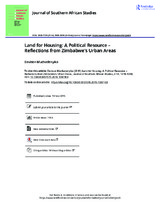Land for housing: A political resource – reflections from Zimbabwe’s urban areas
Abstract
When the Zimbabwean government launched the Fast Track Land Reform Programme (FTLRP)
in 1999, an international outcry followed, with Zimbabwe described as an international pariah
state. Zimbabwe entered a prolonged socio-economic and political crisis. While conventional
opposition attacks the FTLRP for its negative impacts on agriculture, food security and
economic growth, this article argues that the programme has also had widespread impacts on
access to housing land. Over the years, the main political tool used by the ruling Zimbabwe
African National Union (Patriotic Front) (ZANU[PF]) was land, especially in rural areas.
Later, especially in urban and peri-urban areas, ZANU(PF) used peri-urban farms to bolster
its waning support in the urban constituencies. Through ZANU(PF)-aligned co-operatives
and land barons, the party became a major player in deciding who had access to land for
housing. On the other hand, the opposition Movement for Democratic Change (MDC) tried
to use its majority control of urban areas to give its supporters land for housing, albeit with
limited success. MDC-controlled urban administrations were incapacitated, as most urban
land was under a de facto ZANU(PF) administration. This article focuses in particular on the
allocation of housing land between 2000 and 2012 in Zimbabwe’s major cities. The ZANU(PF)
approach to housing bypassed urban planning regulations, with catastrophic effects on urban
infrastructure planning.

